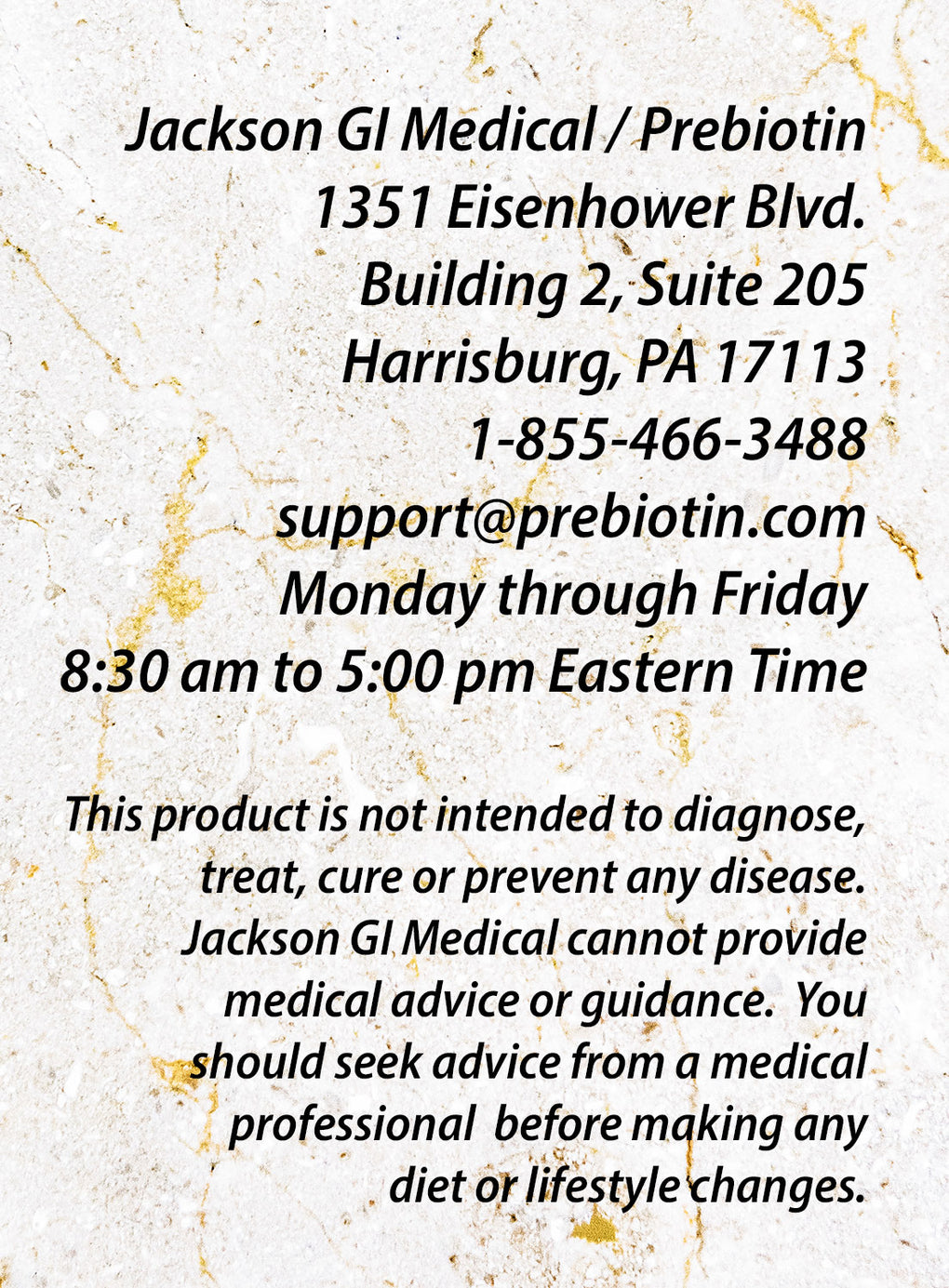
by Dr. Frank Jackson
Prebiotin Academy
Medical Concerns, Scientific Research and Diets
Fissure, Fistula and Abscess
The Facts
Introduction
The intestinal tract (or bowel) ends with the rectum. The outside opening is called the anus. There are several common problems, including hemorrhoids that can occur in this area. While almost everyone has heard of hemorrhoids, certain other conditions are not so well known.
Anal Fissure
An anal fissure is a small tear in the lining of the anus, similar to a tear at the corner of the mouth in cold weather. It often results from a hard dry bowel movement which causes a tear in the tissue. Fissures can be quite painful during and immediately following bowel movements. There may also be bleeding or itching. The diagnosis can be made by a simple visual examination of the anus and surrounding tissue.
Treatment of Anal Fissure
More than half of all fissures heal either by themselves or with non-surgical treatment. Stool softeners can help reduce pain during bowel movements. Antibiotics may be used for a short time. Specially medicated creams may also be used, especially if the fissure has become ulcerated or infected. It is important to keep the anus and area between the buttocks clean and dry. After bathing, the patient should gently pat the area dry with a soft towel. Applying talcum powder may be helpful. Soaking the anal area in warm bath water for 15-20 minutes several times a day should be tried.
Fissures that do not heal can be corrected with surgery. It is a minor operation that is usually done on an outpatient basis. The surgeon removes the fissure and any underlying scar tissue. Cutting a small portion of the anal muscle prevents spasm. This helps the area to heal and rarely interferes with the control of bowel movements. Complete healing takes place in a few weeks.
Over 90% of the patients who need surgery for fissures have no further problems. Patients can help avoid the return of fissures by drinking adequate fluid and maintaining a high fiber diet. Prebiotic food fibers are a special type of fiber that provides certain health benefits within the colon. These fibers may help to prevent constipation, which is the cause of most fissures. To learn more about high fiber diets, go to our High Fiber Diet page.
Anal Abscess and Fistula
An abscess is a localized pocket of pus caused by infection from bacteria. It can occur in any part of the body. When bacteria seep into the underlying tissues in the anal canal, an abscess may develop. Certain conditions, such as Crohn’s disease (chronic inflammatory bowel disease), can increase the risk of abscess in and around the anal canal. Patients with conditions that reduce the body’s immunity, such as cancer or AIDS, are also more likely to develop anal abscesses.
An abscess causes tenderness, swelling, and pain. These symptoms clear when the abscess is drained. The patient may have a fever, chills, and general weakness or fatigue.
A fistula is a tiny channel or tract that develops in the presence of inflammation and infection. It may or may not be associated with an abscess, but like abscesses, certain illnesses such as Crohn’s disease can cause fistulas to develop. The channel usually runs from the rectum to an opening in the skin around the anus. However, sometimes the fistula opening develops elsewhere. For example, in women with Crohn’s disease or obstetric injuries, the fistula could open into the vagina or bladder.
Since fistulas are infected channels, there is usually some drainage. Often, a draining fistula is not painful, but it can irritate the skin. An abscess and fistula often occur together. If the opening of the fistula seals over before the fistula is cured, an abscess may develop behind it.
Diagnosis Anal Abscess
Diagnosis of an abscess is usually made on examination of the area. If it is near the anus, there is always pain, and often redness and swelling. Signs of a fistula and abscess may not be present on the skin’s surface or around the anus. In this case, the physician uses an instrument called an anoscope to see inside the anal canal and lower rectum.
Whenever the physician finds an abscess, and especially a fistula, further tests are needed to be sure Crohn’s disease is not present. Blood tests, x-rays, and a colonoscopy (a lighted, flexible scope exam of the bowel or colon) are often required.
Treatment for Anal Abscess
An abscess must be surgically opened to promote drainage and relieve pressure. This is often done in the physician’s office under local anesthesia. However, patients with a large or deep abscess, or those who have other conditions, such as diabetes, may be admitted to the hospital for the procedure.
Antibiotics cannot take the place of draining an abscess. However, they are usually prescribed along with surgical drainage, especially if the patient has other serious diseases, such as diabetes or those associated with reduced immunity.
Treatment of Anal Fistula
Treatment of anal fistula often varies, depending on whether Crohn’s disease is present or not. Crohn’s disease is a chronic inflammation of the bowel, including the small and/or large intestine. As noted, the physician will often do tests to see if this disease is present. If so, then other therapies are needed.
If Crohn’s disease is not present, it still may be worthwhile to try a course of antibiotics. If these do not work, surgery is usually very effective. The surgeon opens the fistula channel so that healing occurs from the inside out. Most of the time, fistula surgery is done on an outpatient basis or with a short hospital stay. Following surgery, there may be mild to moderate discomfort for a few days. Patients usually have a short recovery period.
Summary
Bleeding, pain or drainage from the anus can occur with several illnesses, so a physician should always be consulted. Often the diagnosis is an anal fissure, abscess, or fistula. These are problems that are usually easy to diagnose and correct. A variety of treatments, including surgery, are available to correct these conditions. Working together with the physician usually assures a good outcome.
Explore More
Medical Concerns, Scientific Research and Diets
-
Antibiotics and the Microbiome
-
C. Difficile
-
Calcium and Bone Density
-
Cancer
-
Celiac Disease and Gluten Intolerance
-
Children and Prebiotics
-
Colon Gas and Flatus
-
Colon Polyps and Cancer
-
Constipation
-
Crohn’s Disease
-
Diabetes Type 2
-
Diarrhea
-
Diverticulosis
-
Dysbiosis
-
End Stage Kidney Disease/Dialysis
-
Fatty Liver/Steatohepatitis
-
Fissure, Fistula and Abscess
-
Gut-Brain Connection
-
Heart and Cardiovascular
-
Hemorrhoids
-
High Fiber Diet
-
Immunity
-
Inflammatory Bowel Disease
-
Irritable Bowel Syndrome
-
Leaky Gut Syndrome
-
Low Fat Diet
-
Low Fiber Diet
-
Obesity and Weight Management
-
Toxins in the Colon
-
Ulcerative Colitis





